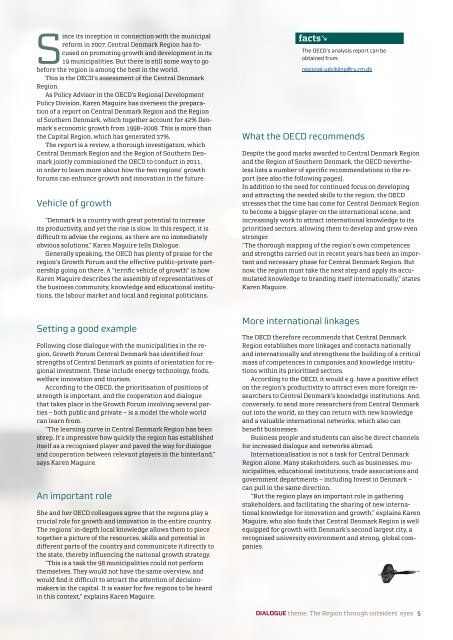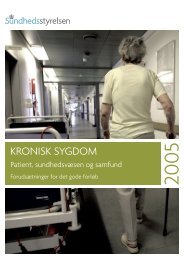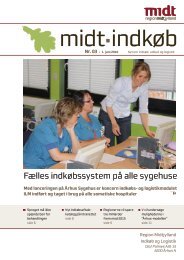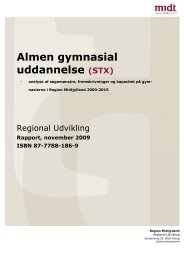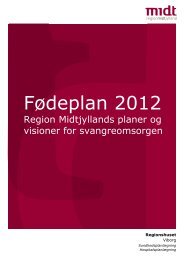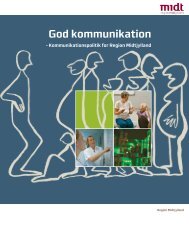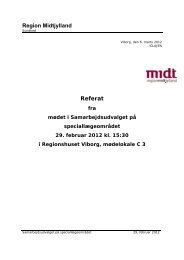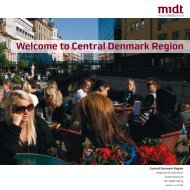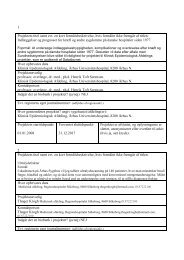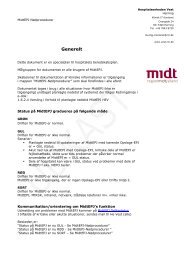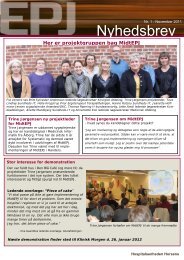OECD commends Central Denmark Region - Region Midtjylland
OECD commends Central Denmark Region - Region Midtjylland
OECD commends Central Denmark Region - Region Midtjylland
Create successful ePaper yourself
Turn your PDF publications into a flip-book with our unique Google optimized e-Paper software.
Since its inception in connection with the municipalreform in 2007, <strong>Central</strong> <strong>Denmark</strong> <strong>Region</strong> has focusedon promoting growth and development in its19 municipalities. But there is still some way to gobefore the region is among the best in the world.This is the <strong>OECD</strong>’s assessment of the <strong>Central</strong> <strong>Denmark</strong><strong>Region</strong>.As Policy Advisor in the <strong>OECD</strong>’s <strong>Region</strong>al DevelopmentPolicy Division, Karen Maguire has overseen the preparationof a report on <strong>Central</strong> <strong>Denmark</strong> <strong>Region</strong> and the <strong>Region</strong>of Southern <strong>Denmark</strong>, which together account for 42% <strong>Denmark</strong>’seconomic growth from 1998–2008. This is more thanthe Capital <strong>Region</strong>, which has generated 37%.The report is a review, a thorough investigation, which<strong>Central</strong> <strong>Denmark</strong> <strong>Region</strong> and the <strong>Region</strong> of Southern <strong>Denmark</strong>jointly commissioned the <strong>OECD</strong> to conduct in 2011,in order to learn more about how the two regions’ growthforums can enhance growth and innovation in the future.Vehicle of growth“<strong>Denmark</strong> is a country with great potential to increaseits productivity, and yet the rise is slow. In this respect, it isdifficult to advise the regions, as there are no immediatelyobvious solutions,” Karen Maguire tells Dialogue.Generally speaking, the <strong>OECD</strong> has plenty of praise for theregion’s Growth Forum and the effective public-private partnershipgoing on there. A “terrific vehicle of growth” is howKaren Maguire describes the assembly of representatives ofthe business community, knowledge and educational institutions,the labour market and local and regional politicians.factsmThe <strong>OECD</strong>’s analysis report can beobtained from:regional-udvikling@ru.rm.dkWhat the <strong>OECD</strong> re<strong>commends</strong>Despite the good marks awarded to <strong>Central</strong> <strong>Denmark</strong> <strong>Region</strong>and the <strong>Region</strong> of Southern <strong>Denmark</strong>, the <strong>OECD</strong> neverthelesslists a number of specific recommendations in the report(see also the following pages).In addition to the need for continued focus on developingand attracting the needed skills to the region, the <strong>OECD</strong>stresses that the time has come for <strong>Central</strong> <strong>Denmark</strong> <strong>Region</strong>to become a bigger player on the international scene, andincreasingly work to attract international knowledge to itsprioritised sectors, allowing them to develop and grow evenstronger.“The thorough mapping of the region’s own competencesand strengths carried out in recent years has been an importantand necessary phase for <strong>Central</strong> <strong>Denmark</strong> <strong>Region</strong>. Butnow, the region must take the next step and apply its accumulatedknowledge to branding itself internationally,” statesKaren Maguire.Setting a good exampleFollowing close dialogue with the municipalities in the region,Growth Forum <strong>Central</strong> <strong>Denmark</strong> has identified fourstrengths of <strong>Central</strong> <strong>Denmark</strong> as points of orientation for regionalinvestment. These include energy technology, foods,welfare innovation and tourism.According to the <strong>OECD</strong>, the prioritisation of positions ofstrength is important, and the cooperation and dialoguethat takes place in the Growth Forum involving several parties– both public and private – is a model the whole worldcan learn from.“The learning curve in <strong>Central</strong> <strong>Denmark</strong> <strong>Region</strong> has beensteep. It’s impressive how quickly the region has establisheditself as a recognised player and paved the way for dialogueand cooperation between relevant players in the hinterland,”says Karen Maguire.An important roleShe and her <strong>OECD</strong> colleagues agree that the regions play acrucial role for growth and innovation in the entire country.The regions’ in-depth local knowledge allows them to piecetogether a picture of the resources, skills and potential indifferent parts of the country and communicate it directly tothe state, thereby influencing the national growth strategy.“This is a task the 98 municipalities could not performthemselves. They would not have the same overview, andwould find it difficult to attract the attention of decisionmakersin the capital. It is easier for five regions to be heardin this context,” explains Karen Maguire.More international linkagesThe <strong>OECD</strong> therefore re<strong>commends</strong> that <strong>Central</strong> <strong>Denmark</strong><strong>Region</strong> establishes more linkages and contacts nationallyand internationally and strengthens the building of a criticalmass of competences in companies and knowledge institutionswithin its prioritised sectors.According to the <strong>OECD</strong>, it would e.g. have a positive effecton the region’s productivity to attract even more foreign researchersto <strong>Central</strong> <strong>Denmark</strong>’s knowledge institutions. And,conversely, to send more researchers from <strong>Central</strong> <strong>Denmark</strong>out into the world, so they can return with new knowledgeand a valuable international networks, which also canbenefit businesses.Business people and students can also be direct channelsfor increased dialogue and networks abroad.Internationalisation is not a task for <strong>Central</strong> <strong>Denmark</strong><strong>Region</strong> alone. Many stakeholders, such as businesses, municipalities,educational institutions, trade associations andgovernment departments – including Invest in <strong>Denmark</strong> –can pull in the same direction.“But the region plays an important role in gatheringstakeholders, and facilitating the sharing of new internationalknowledge for innovation and growth,” explains KarenMaguire, who also finds that <strong>Central</strong> <strong>Denmark</strong> <strong>Region</strong> is wellequipped for growth with <strong>Denmark</strong>’s second largest city, arecognised university environment and strong, global companies.DIALOGUE theme: The <strong>Region</strong> through outsiders’ eyes 5


